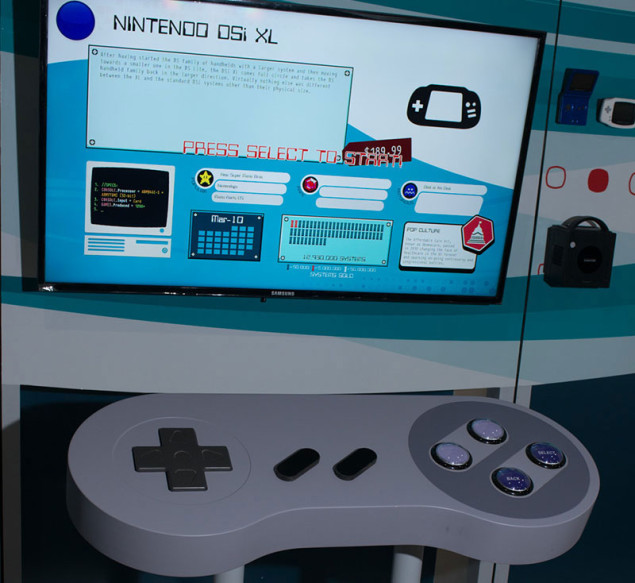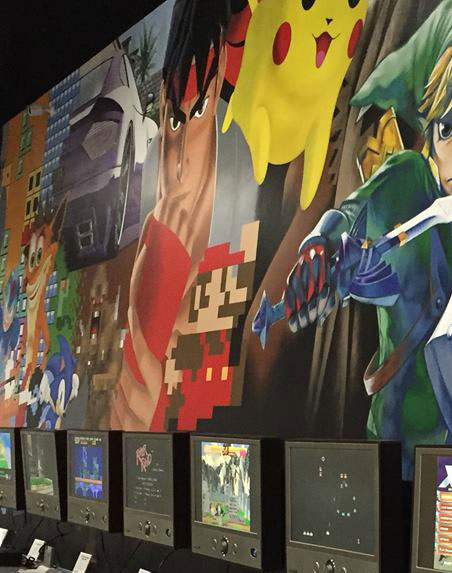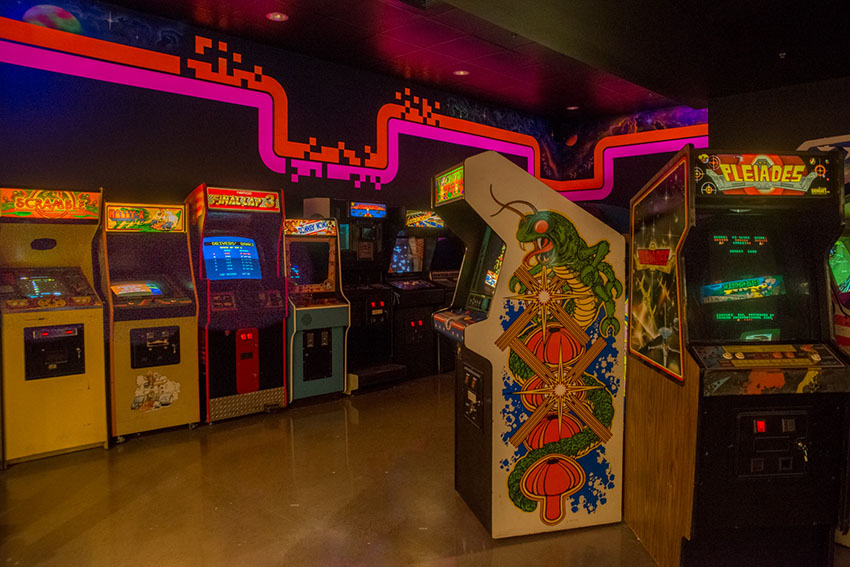They should be familiar sights to anyone who grew up playing video games in the 1980s: A neon-lit arcade crowded with games like Donkey Kong and Centipede, and a bedroom equipped with a Nintendo Entertainment System humming under the smirking gaze of a Ferris Bueller poster. Sean Kelly, who cut his gaming teeth on an Intellevision in the ’80s, should feel right at home in the video game museum he co-founded with Joe Santulli and John Hardie.
Along with the faithful and interactive re-creations of gaming’s halcyon days, the new National Videogame Museum in the Frisco Discovery Center offers a walkthrough of the history of the industry, a head-to-head gaming hall, the world’s largest Pong console, and thousands of artifacts and pieces of memorabilia, much of it collected by Kelly and his partners over the last three decades.
What started as a trip down memory lane evolved into a hobby and, eventually, something more, as Kelly and his co-founders spent years taking their extensive private collections on the road to exhibit at various conventions. Now, those collections have found a permanent home. Ahead of the museum’s grand opening this weekend, we talked with Kelly about nostalgia, Super Meat Boy, and the educational value of video games.
What inspired you to start collecting all the games, memorabilia, and video game artifacts that are on display in the museum? The driving force behind anything like this is, initially, nostalgia. I started collecting in about 1988. I had an Intellivision when I was a kid. I sold it off and decided to chase girls for a couple years, and when I finally landed one, I wanted my video games back. I started trying to regain everything that I had gotten rid of over the years, and it just kind of snowballed from that. All three of us [Kelly and the co-founders] realized there was something more to it than just video games. We knew back then, even when the market was crashing, it was bigger than what people were giving it credit for. We thought it was a pretty important part of our lives. It’s a lot more than just a game. It’s a point in your life. Whether you collect PEZ dispensers or roller skates or video games, you collect it to bring back a certain part of your life.
As you look at the history of video games, you can see very obvious changes in the technology and size of the industry. At the same time, there seems to have been some major changes in the public perception of video games. Is that something you’ve seen yourself or something you’ve observed looking at the history of video games? Absolutely. I think 46 percent of the population plays video games. I look at that as one of the overlooked reasons for the (video game market crash of 1984). In ‘84, it was all one age group of people playing games. It was generally people that were 12 to 15 years old. Now, the difference is there are multiple generations playing video games.
Why do you think it’s important for younger people to familiarize themselves with older video games, rather than Call Of Duty or whatever happens to be big right now? It’s just like anything else. If you don’t learn from history, you’re doomed to repeat it. One thing you have to keep in mind is that, in the beginning, video games on the early systems were just made to be something that was fun. They didn’t have a lot of computing power or sound or graphics capabilities. I think too many people today lose sight of the fact that the main objective is to make a game that’s fun. They worry about making something pretty. You see way too much crap out there. There are some systems that are notorious for shovelware crap, and I think kids–especially the last console generation–they were exposed to a whole lot of it.
Sort of a return to a more joyful, simple time? You’ll see a lot of that with the indie stuff coming out now. Super Meat Boy is one. Even something like Flappy Bird. Some of the games today–not that there’s not a time and a place for both–but you’ve got to quit your job to play these games.

Anyone who thinks video games are fun is probably going to think a video game museum is fun, but how do you sell a field trip to the National Videogame Museum to a teacher? What’s the educational value that would convince a class to come? We’re not even open yet, and we’ve had, I think, over 40 different schools contact us about field trips at the museum. It is kind of an interesting problem because how do you convince school boards or whoever pays for these field trips that they’re not just coming to play Call Of Duty or Super Mario Bros.? There are a lot of things that are involved in making a video game. There’s math, there’s science, there’s technology, there’s art.
The other part of it: We’ve been collecting or archiving video games for 25 to 30 years, so we have built relationships with a lot of industry pioneers. People like David Crane, who founded Activision, or Al Allcorn, who invented the original Pong arcade machine. If we’re putting together summer camps, how cool would it be to write a Pitfall! level with David Crane, or to build your own Pong machine with the guidance of Al Allcorn? We’ve got a really good relationship with (video game developer) Gearbox Software, which is only about three blocks away from the museum. How about one of the Gearbox artists coming in and giving a talk on the art of video games? The historical aspect of video games is an education in itself, but there has to be a real-world education as well.
Why Frisco? We were shopping the concept around to several different cities, and our kneejerk reaction was to put it in Silicon Valley, where Atari was born, and where video games were born. They weren’t interested enough to make it possible. We’re pretty good friends with Randy Pitchford (co-founder of Gearbox Software), and Randy was in the process of moving his office from Plano to Frisco. After several meetings with the city council and the mayor [in Frisco], they loved the idea. They have a vision for that area. The American Railroad Museum is in that space. The Sci-Tech museum and the Heritage Museum are there.
You’re obviously knowledgeable about the history of video games. What’s the next big development for the future of video games? Is it virtual reality? I don’t think there is one next big thing for video games. I think it’s going to be a combination of things. If you go back and look at the different innovations Nintendo has used over the last few years, with the motion controller on the Wii–As successful as it was, it was pretty much a fad. The next one coming down the pipeline is the virtual reality headsets, and I don’t honestly think that will be the next big thing. It will be a bunch of these different technologies that will be the next thing.

What is your favorite thing in the museum? My favorite thing is the art. We had some amazing artists come and visit and so some murals and different treatments to different walls for various themes and exhibits. It was an afterthought. We sat down about six or eight months into the project and said, ‘We got all these walls, what are we going to do with them?’ We happened to be sharing a building with the Frisco arts organization at that time, so I went to the director of the Frisco Arts and said, ‘Can you put us in touch with some of the different artists in your group?’ The art, to me, has really given the museum a personality. And it’s a local thing. They’re all local artists. Is there a certain section I love? The ‘80s bedroom. We’ve been building an ‘80s living room for 15 years in the different traveling exhibits we’ve done, but this time, since we’re in a stationary space, I thought that we should go to the next level and build a bedroom too.
What’s your favorite video game of all time? I grew up playing Intellevision in the early ‘80s. Again, nostalgia drives a lot of this stuff. My favorite game is a game called Sea Battle on Intellevision. It was this naval warfare game. Not crazy complicated. It’s you against another guy. You’re trying to take over his base and he’s trying to take over your base. It’s funny because it hasn’t really been re-created on anything else, which is kind of unusual. There aren’t too many concepts, or fun concepts, that don’t somehow get re-created.
This Q&A was condensed and edited for clarity.
The National Videogame Museum opens Saturday, April 2. Tickets are $12 for ages 11 and up, and $10 for ages 10 and under.
[d-embed][/d-embed]





